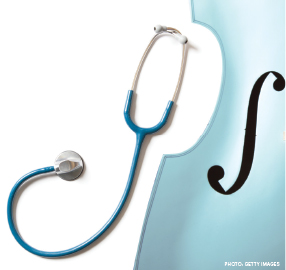Guest Editor’s Note: Cancer and its treatments are associated with both physical and psychological symptoms that can have substantial impact on patients’ quality of life. Music therapy is a complementary modality that is being increasingly used for cancer symptom management. In this article, Joke Bradt, PhD, MT-BC, describes the findings of a recent review of clinical trials on music interventions and their impact on patients with cancer.

Joke Bradt, PhD, MT-BC
In a recently published Cochrane review,1 my colleagues and I reported on the analysis of 81 trials that examined the impact of music interventions on psychological and physical outcomes in people with cancer. This review was an update of our 2016 Cochrane systematic review.
Music interventions are increasingly used to address psychosocial issues and enhance the quality of life in people with cancer. In the podcast that accompanies our Cochrane review, we described that “the use of music in cancer care can be situated along a continuum of care, from music listening initiated by patients, through prerecorded music offered by medical personnel, to music interventions offered by a trained music therapist.”
Music therapists are trained to help explore existential questions and worries evoked by a cancer diagnosis, offer emotional and spiritual support, facilitate meaningful interactions with loved ones, and improve symptom management. Therapists may use a variety of music experiences to achieve these therapeutic goals, including improvising music with patients, singing familiar songs, helping patients write original songs, or playing live music selected by patients.
Methods
The objective of the review was to assess and compare the effects of music therapy and music medicine interventions for psychological and physical outcomes in adult and pediatric patients undergoing cancer treatments. Music therapy was defined as music interventions offered by trained music therapists, and music medicine was defined as listening to prerecorded music offered by medical staff.
The review included 74 trials with adults and 7 trials with children. Studies with participants undergoing biopsy, bone marrow biopsy, and aspiration for diagnostic purposes as well as studies with cancer survivors were excluded.
Main Findings
The analysis included data from 81 randomized and quasi-randomized controlled trials, with a total of 5,576 participants. A total of 38 trials were categorized as music therapy trials and 43 as music medicine trials. The music interventions were compared against standard care.
The results suggest that music therapy and music medicine interventions may have a large anxiety-reducing effect in adults with cancer, with a reported average anxiety reduction of 7.73 units (95% confidence interval [CI] = –10.02 to –5.44) on the Spielberger State Anxiety Inventory scale (range, 20–80). Results also suggest a moderate depression-reducing effect of music interventions (standardized mean difference [SMD] = −0.41, 95% CI −0.67 to −0.15), but no support was found for an effect of music interventions on general mood (SMD = 0.47, 95% CI = −0.02 to 0.97). We also reported that music interventions may increase hope in adults with cancer, with an average increase of 3.19 units (95% CI = 0.12–6.25) on the Herth Hope Index (range, 12–48), but we caution that this finding was based on only two studies.
Music interventions had a large effect on adult participants’ quality of life, but the results were highly inconsistent across studies (SMD = 0.88, 95% CI = −0.31 to 2.08). Removal of studies that used improper randomization methods resulted in a moderate effect size that was less heterogeneous (SMD = 0.47, 95% CI = 0.06–0.88). For physical outcomes, a moderate pain-reducing effect (SMD = −0.67, 95% CI = −1.07 to −0.26) and a small fatigue-reducing effect (SMD = −0.28, 95% CI = −0.46 to −0.10) were found.
Seven trials included children. The findings suggest that music interventions may reduce anxiety in pediatric patients, but these findings were based on only two studies (SMD = −0.94, 95% CI = −1.9 to 0.03).
A noteworthy finding was that for anxiety, depression, pain, fatigue, and quality of life, the beneficial treatment effects were consistent across studies for music therapy interventions. In contrast, music medicine interventions resulted in inconsistent treatment effects across studies for these outcomes.

Most studies included in this review were rated as having a high risk of bias. For many trials, masking participants and interveners was not possible, especially in trials in which participants are actively engaged in making music with a music therapist.
Conclusion
Evidence from this review suggests that music interventions may be offered as a complementary treatment to manage symptoms and improve quality of life in people with cancer. Music therapy interventions delivered by a trained music therapist may lead to more consistent results than listening to prerecorded music offered by medical staff. However, due to the high risk of bias for many of the studies included in this review, these findings need to be interpreted with caution.
Here are several research recommendations for future studies. First, randomized trials are needed to directly compare music medicine vs music therapy interventions. Second, more trials are needed in pediatric cancer care. Third, future research should examine how music interventions can be optimized for symptom management and how music interventions can best serve patients along the cancer treatment trajectory. Finally, although music interventions have a robust evidence base for anxiety, there is a critical need for rigorous studies on other psychological and physical outcomes in cancer.
DISCLOSURE: Dr. Bradt reported no conflicts of interest.
REFERENCE
1. Bradt J, Dileo C, Myers-Coffman K, et al: Music interventions for improving psychological and physical outcomes in people with cancer. Cochrane Database Syst Rev 10:CD006911, 2021.

